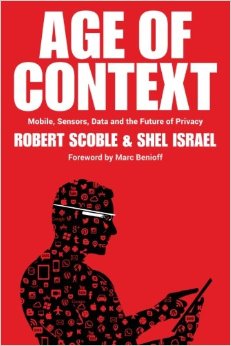We are taking our first baby steps into The Age of Context. Ten years ago cell phones were used for making phone calls and not much else. Now they are control centers for many of us. Similarly, in ten years sensors embedded everywhere, including on us, will feed us steady streams of information, increasingly make decisions for us, and enhance our lives in ways we’ve not thought of yet.
From the book (emphasis added)
In The Perfect Storm, author Sebastian Junger described a rare but fierce weather phenomenon caused by the convergence of three meteorological forces: warm air, cool air, and tropical moisture. Such natural occurrences cause 100-foot waves, 100-mph winds and—at least until recently—occur about once every 50-100 years.
Our perfect storm is composed not of three forces, but five, and they are technological rather than meteorological: mobile devices, social media, big data, sensors and location-based services.
The tsunami of the Internet of Things is coming and cannot be escaped from. Much of it is good, too.
Pills with tiny embedded sensors that notify a temporary skin patch that the pills has been ingested will certainly save lives. Front, side, and rear detectors in cars will sense oncoming potential collisions and the car will take emergency action. Wearable health monitors will alert us to health problems before we know we have them.
A friend died a few years back because he got his meds mixed up. He was taking them once a week not once a day and insisted he was taking them correctly. By the time doctors figured out what happened, it was too late. Pills with sensors probably would have saved his life.
Based on what Age of Context says, I doubt driverless cars will ever be used much more than on city streets in carefully controlled conditions. Apparently the Google Car has trouble in fog and has difficulty spotting ice. This makes it dangerous for driving in bad weather or icy conditions.
The Age of Context discusses this and much more, focusing on the multiplicity of ways the Internet of Things will change our lives. The authors believe these changes will be hugely positive but do not ignore the downside of being watched and monitored 24/7. The systems must be opt-in, you must be able to easily turn them off, and privacy must be respected.
Amazon
The authors are unabashed tech enthusiasts, but as they write, an elephant sits in the living room of our book and it is called privacy. We are entering a time when our technology serves us best because it watches us; collecting data on what we do, who we speak with, what we look at. There is no doubt about it: Big Data is watching you. The time to lament the loss of privacy is over. The authors argue that the time is right to demand options that enable people to reclaim some portions of that privacy.
There is an overwhelming amount of information in Age of Context. Perhaps that was their point! The next ten years will be dizzying indeed.
